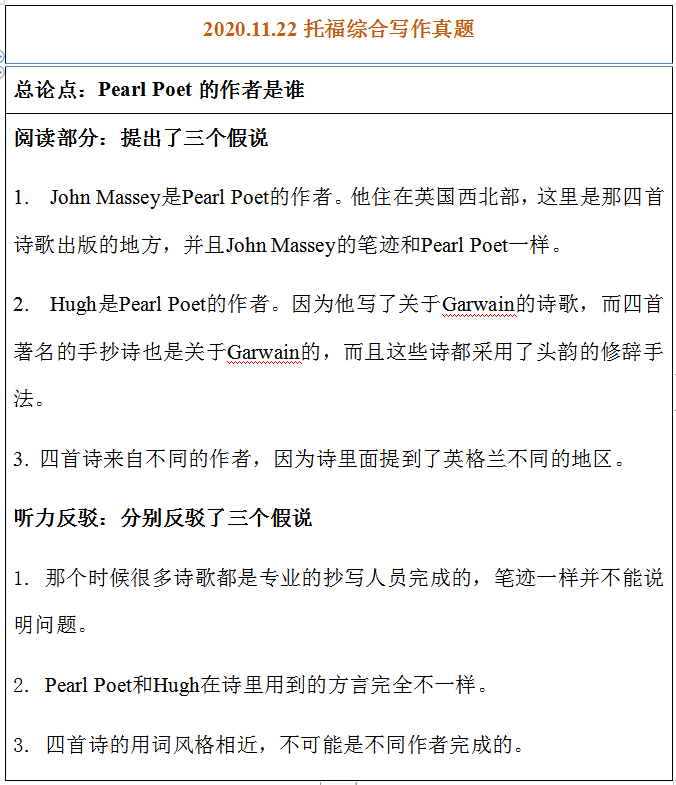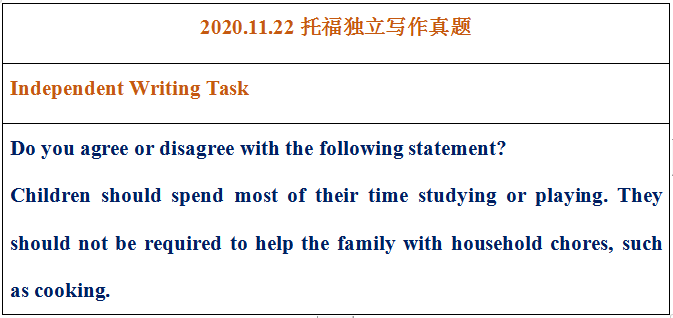
作者:北美考试院 托福写作组 张晟凯

解题思路:
此题是阅读材料提出三种假说,而听力材料分别反驳这三种假说的综合写作题型,需要考生抓住听力中反驳的要点,并在文章中进行尽可能详尽的复述。
本题考查的话题属于托福综合写作中相对而言占比较少的文化艺术类话题,探讨的是“Pearl Poet的作者是谁”。在TPO中有两个题目涉及到了文化艺术类话题,包括TPO3和TPO12,分别探讨的是“一幅画是否是伦勃朗的作品”以及“一幅肖像画中的人物是否是简奥斯汀”。考生可适度选择上述提到的TPO材料,熟悉相关话题,分析材料结构和写作结构。
可以类比TPO 12的综合写作:一幅肖像画中的人物是否是简奥斯汀TPO 46 综合写作
阅读部分:画中的人就是简奥斯汀
Main idea: Although the professional painting is not titled Jane Austen, there are good reasons to believe she is the subject.
· The Austen family itself has endorsed the claim that the girl in the portrait is Jane Austen. 奥斯汀家族一直支持这一说法,即画像中的女孩就是简奥斯汀。
· The face in the portrait clearly resembles the one in Cassandra's sketch, which we know depicts Austen. 肖像中的脸显然很像卡桑德拉的素描,我们知道这张素描描绘的是奥斯汀。
· The style links it to Ozias Humphrey, a society portrait painter who was the kind of professional the wealthy Austen family would hire. Humphrey was active in the period when Jane Austen was the age of the girl in the painting. 画的风格与欧齐亚斯·汉弗莱联系在一起,他是一位社会肖像画家,是富裕的奥斯汀家族雇佣的那种专业人士。汉弗莱活跃于简奥斯汀正是画中女孩的年龄。
听力反驳:画中的人并不是简奥斯汀
Main idea: The evidence linking this portrait to Jane Austen is not at all convincing.
· The family members who asserted that the painting was Jane had never actually seen her themselves. They couldn't have known for certain if the portrait was of Austen or not. 那些声称这幅画是简的家庭成员实际上从未见过她本人。他们不可能确定这幅画是不是奥斯汀的。
· Many experts believe that the true subject of the portrait was one of those relatives, Marianne Kempian, who was a distant niece of Austen's.. 许多专家认为,这幅肖像画的真实主人是其中一位亲戚,玛丽安·凯皮安,她是奥斯汀的远房侄女。
· A stamp on the back of the picture indicates that the blank canvas, you know the actual piece of cloth on which the picture was painted, was sold by a man named William Legg. Record showed that William Legg did not sell canvases in London when Jane Austen was a teenager. 图片背面的一张邮票表明,一张名叫威廉莱格的男子出售了这个空白画布。记录显示,威廉莱格在简奥斯汀十几岁的时候并没有在伦敦卖油画。

题目解析:
11月22日的托福独立写作探讨的是是否同意观点“孩子应该把大部分时间花在玩耍和学习上,而不应被要求去做任何家务”。对于这道题,我们可以按词类的题型来理解,选择不同意的观点,并使用让步的写法——“诚然,孩子们应该花一些时间去学习和玩耍。然而,他们也应该去做一些家务劳动。”
对于具体的文章结构和思路,我们可以安排三个主体段,段强调观点中的合理性,即“孩子们应该去玩耍和学习,这对他们的发展有好处”,第二段和第三段则分别论述观点中的性,并给出理由,即“做一些家务活可以培养孩子的家庭责任感”以及“做一些家务活有助于增强孩子的独立生活能力”。
请参考如下范文:
From past to present, children’s education has been attached enormous significance to by people from all walks of life. Regarded as one of the most essential parts of preschool education, kids’ upbringing in their family seems to be a debatable issue. Recently, an interesting discussion about whether children should spend most of their time studying or playing and not be required to assist the family with housework has arisen. From my point of view, the answer is negative and my reasons are given below.
Admittedly, studying and playing indeed occupy most of the children’s time, both of which are conducive to their development. On the one hand, it is in childhood and adolescence that people are the most efficient in studying. Numerous data have manifested that a person’s memory and ability of learning reach their peak before sixteen years old, which means children are supposed to take enough time to study. On the other hand, to cultivate spirits of innovation and improve creative thinking, parents should allow kids to play. Also, in the process of playing with their peers, children’s faculty of teamwork can be enhanced.
However, it is imperative for parents to ask children to do some housework, which can help to form and reinforce children’s sense of family responsibility. It is universally acknowledged that only by giving are people able to know the meaning of duty. Therefore, undertaking some household chores will let kids feel that they are a part of the whole family. In that case, they may be more willing to share joy and pain with other family members. A negative example of this is my brother Jack. Due to his absence in household chores, Jack becomes selfish and show apathy to his parents, which proves the importance of participating in housework such as cleaning the room with families together.
Besides, children’s independent capability will be strengthened if they are engaged in some housework. There is no doubt that people need to learn some basic living skills such as washing clothes and cooking, which are requisite of living independently. After all, children will have to leave their parents and take care of themselves on their own. As you can imagine, those who cannot even look after themselves can hardly make any achievements no matter in academic or professional settings.
To put it in a nutshell, I still firmly believe that it is necessary for kids to do some housework. It is conducive not only to their cultivation of a sense of family responsibility but also to their improvement of independent living. I hope every child can allocate their time appropriately to studying, playing, and other things.